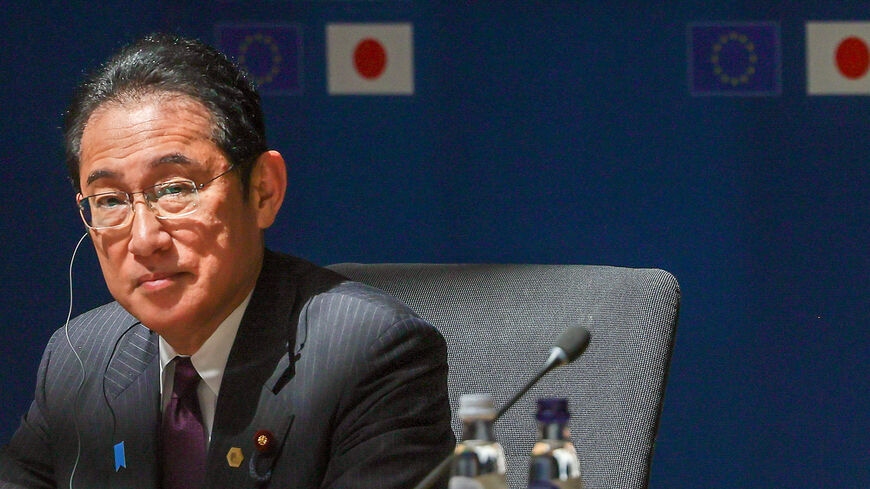DUBAI — Japan’s Prime Minister Fumio Kishida ended his Gulf tour from Doha Tuesday with the hope that he secured his country’s relationship with its most important energy suppliers, as competitor China’s influence grows in the region and Japan’s energy resources are threatened by geopolitics.
Kishida concluded a trip Saudi Arabia, the United Arab Emirates (UAE) and Qatar on Tuesday.
Japan, which already depends on the Middle East for more than 90% of its oil supply, has suffered from the global economic impact of Russia's war on Ukraine that has led to less reliable sources of energy and also increased prices.
The country, also a Group of Seven (G-7) member, holds grave concerns that its alignment with the West has the potential to put it at odds with its primary energy suppliers and jeopardizes its energy security.
Yasutoshi Nishimura, Japan’s minister of economy, trade and industry (METI), voiced the concern and likely consequences of a political escalation between the East and West in regard to Japan’s security, ahead of the 49th G-7 summit held in Hiroshima in May.
“China’s relationship with Middle Eastern oil-producing countries will become so intimate as to lead to the formation of alliances. If Japan, which depends entirely on the United States, is drawn into a state of war with China due to a Taiwan crisis, for example, there may be a possibility of being unable to acquire Middle Eastern oil,” he said, according to a press conference transcript by METI in mid-April.
This fear is compounded by other energy supply constraints including the ongoing recovery from the coronavirus pandemic, which altogether upped Japan’s Middle East energy reliance to 97.7% in July 2022. This is the highest since METI shared its statistical data in 1952.
Shigeto Kondo, senior researcher at the Japanese Institute of Middle Eastern Economies, said this places Gulf countries at an advantage.
“More demand is coming from East Asia like China, Japan, South Korea. So competition among the buyers is very high and Gulf countries are now in a very strong position, so they do not need to lower prices,” Kondo told Al-Monitor.
China has already signed two liquefied natural gas (LNG) agreements with state-owned QatarEnergy. They signed one 27-year agreement with the China National Petroleum Corporation to provide 4 million tons of LNG per year in June, and another for the same time period and amount with Chinese oil giant Sinopec in November 2022.
Qatar, looking to ink more contracts, is offering shorter and cheaper LNG contracts to select countries in order to entice new customers, according to Bloomberg, reporting about QatarEnergy’s 15-year supply deal signed in June with Bangladesh's state-owned PetroBangla for 1.8 million tons starting in 2026.
“Qatar is very strategic. It knows that Japan, South Korea and China have financial power so it’s possible that Qatar shows strict or hard conditions on the buyer,” said Kondo, especially as Kishida is under pressure from Japan’s gas lobby to secure new LNG deals.
He noted that Japan is also finding it increasingly more welcoming to do business with Middle Eastern countries given the recent detente over disputes with Iran and Qatar, and the war in Yemen, which is encouraging Japanese businesses to work more closely with the region.
The UAE — home to the largest number of Japanese expatriates in the Middle East and North Africa at 4,500 people — signed 23 agreements and memoranda of understanding on the sidelines of the UAE-Japan Business Forum held Monday during Kishida’s visit, according to the state-owned Emirates News Agency. The bilateral agreements aim to bolster economic trade and investment in the fields of energy but also areas of advanced technology, artificial intelligence, space and environmental conservation.
Japan is a leading renewable energy products and services provider globally, according to the International Energy Agency. The country also aligns with the strategic goal of achieving carbon neutrality by 2050, set by the UAE that will be hosting the COP28 United Nations climate conference in Dubai in November.
Although politically aligned with the United States, Japan's views on clean energy transition are more similar to those of Gulf energy exporters.
“We [Japan] are promoting renewable energy and so are Gulf oil producers, but we also want to cultivate the other option of using fossil fuels, like making blue ammonia. So we put much emphasis on the technology of carbon capture storage or carbon capture and utilization,” said Kondo, in regard to the view that they share for eliminating carbon emissions rather than fossil fuels.
“So on that point, we have harmony between Japan and Gulf oil producers,” he said. "And this consensus is the reason why Japan signed a total of 26 agreements with Saudi Arabia on Sunday, in part to develop clean hydrogen, mining and producing ammonia and its derivatives along with recycled carbon fuels."
Japan and the Gulf Cooperation Council (includes Saudi Arabia, the UAE, Qatar, Kuwait, Oman and also Bahrain), announced on Sunday the resumption of talks on a free trade agreement.


f0eb.jpg)





